Security is one of the primary concerns for businesses, governments, and individuals. Keeping assets, employees, and customers safe is essential to running any successful operation. One way to enhance security and control access to your building is by implementing an access control system. In this blog, we’ll explore the benefits of Access Control system, the different types of access control available, and how they can improve your security measures.
What is an Access Control System?
An Access Control system is designed to ensure that only authorized personnel have access to specific locations and resources. It allows restriction or permission of entry to a building, room or other restricted premises. An access control system comprises of electronic access keypads, security cameras, smart cards or biometric fingerprint readers. Access control systems significantly reduce the need for human interaction when granting or denying access, effectively eliminating the need for traditional locks and keys – which are often easily copied or lost. They also provide better accountability, especially in larger companies where many people work and share access to various locations.
Types of Access Control Systems
Different types of access control systems are designed to meet different security needs. Some of the common types are:
Card: This system utilizes card keys that are assigned to an individual, and the cards’ data is used for access control.
Biometric: It utilizes human physical characteristics, such as a facial image, iris recognition, fingerprints, etc., to permit or deny access to restricted areas.
Keypad: This system requires the user to input a certain code or password.
Proximity Sensor: a card that works by detecting and reading electronic signals emitted by a transponder device, making it a convenient entry and exit choice for many people.
Smart Card: It requires the user to input a unique digital code assigned to the cardholder.
Benefits of Access Control Systems
Access control systems offer several benefits, including:
Enhanced Security: Control who has access to which areas of your building or premises. This helps reduce the risk of unauthorized entry and enhances physical security.
Remote Access Control Management: The systems can be managed and monitored remotely via a web application browser from any device connected to the internet.
Records and Reports: Access control systems also enable administrators to run reports, including audit trails that identify unauthorized access, attempted entry, and other security hull breaches.
Increased Convenience: Security officers, employees, and customers appreciate the convenience of not having to worry about carrying a set of keys around or finding the right one for every door they need to unlock.
Conclusion:
Overall, access control systems are important security measures that businesses of all sizes should consider. With a wide range of access control systems available, there is always an option that meets the specific security demands of your company or building. By effectively controlling access, you have the peace of mind that comes with secure facilities, and can safeguard your employees, clients, and physical assets. When you’re ready to find the right access control system, consult with security experts to help identify your specific requirements.



